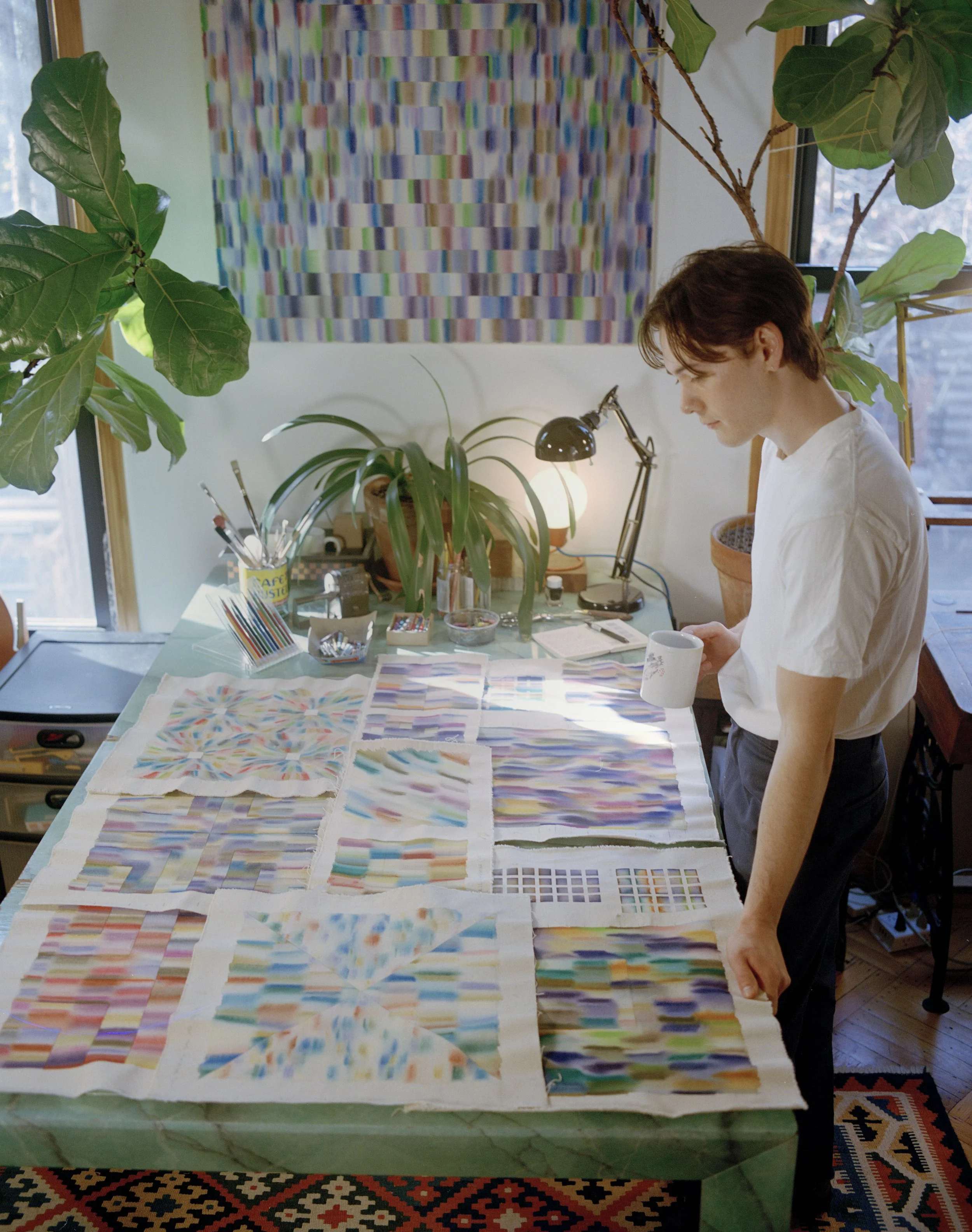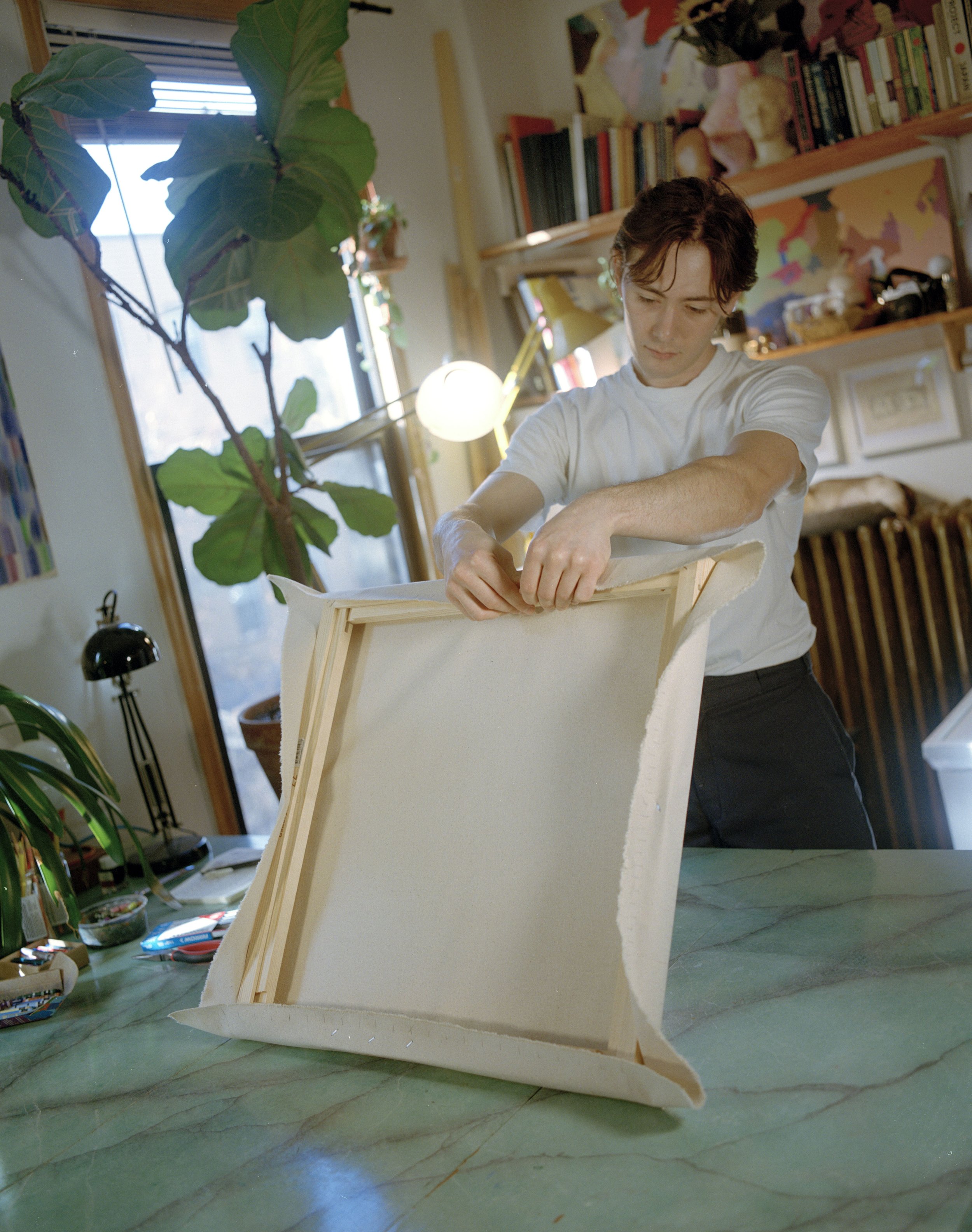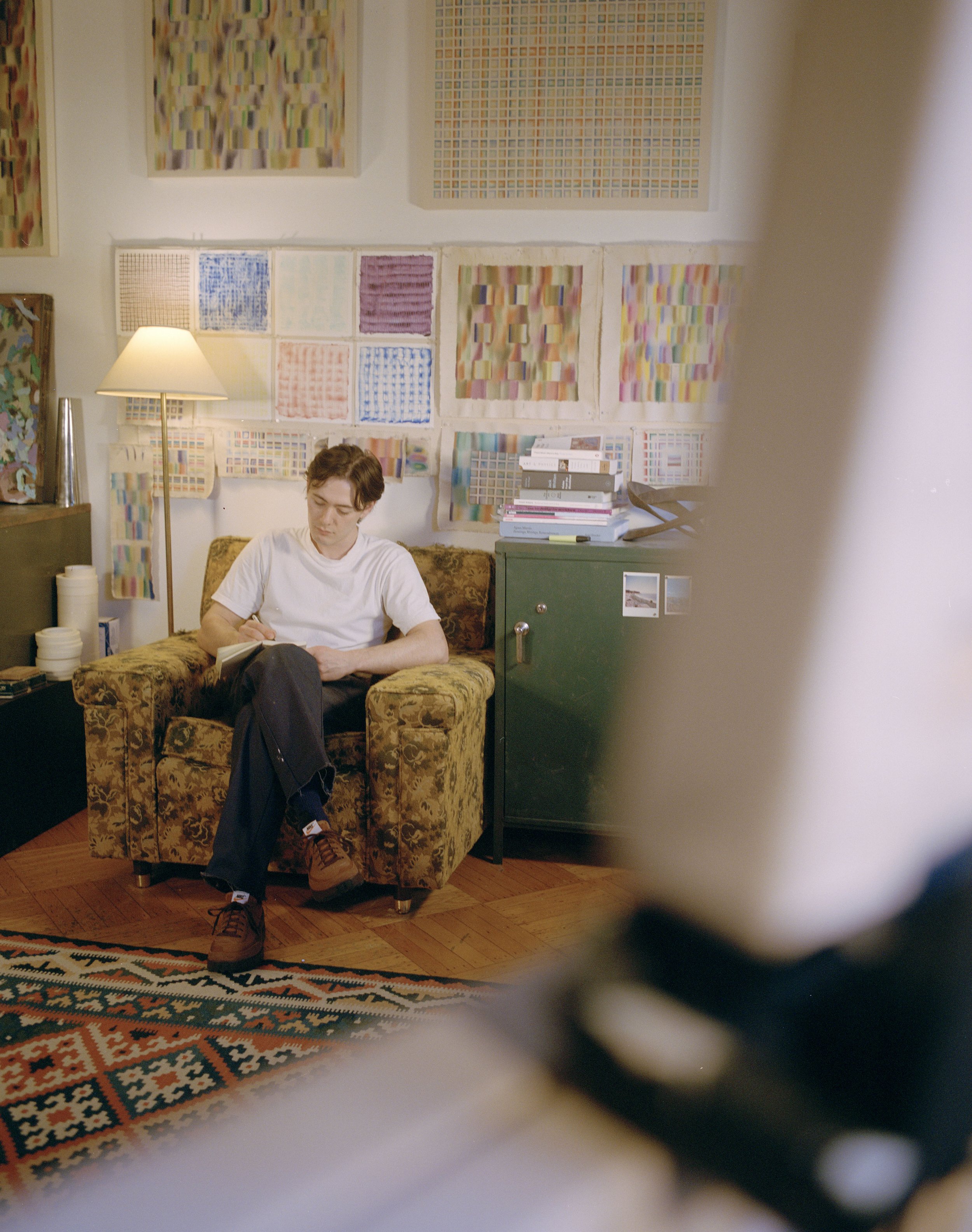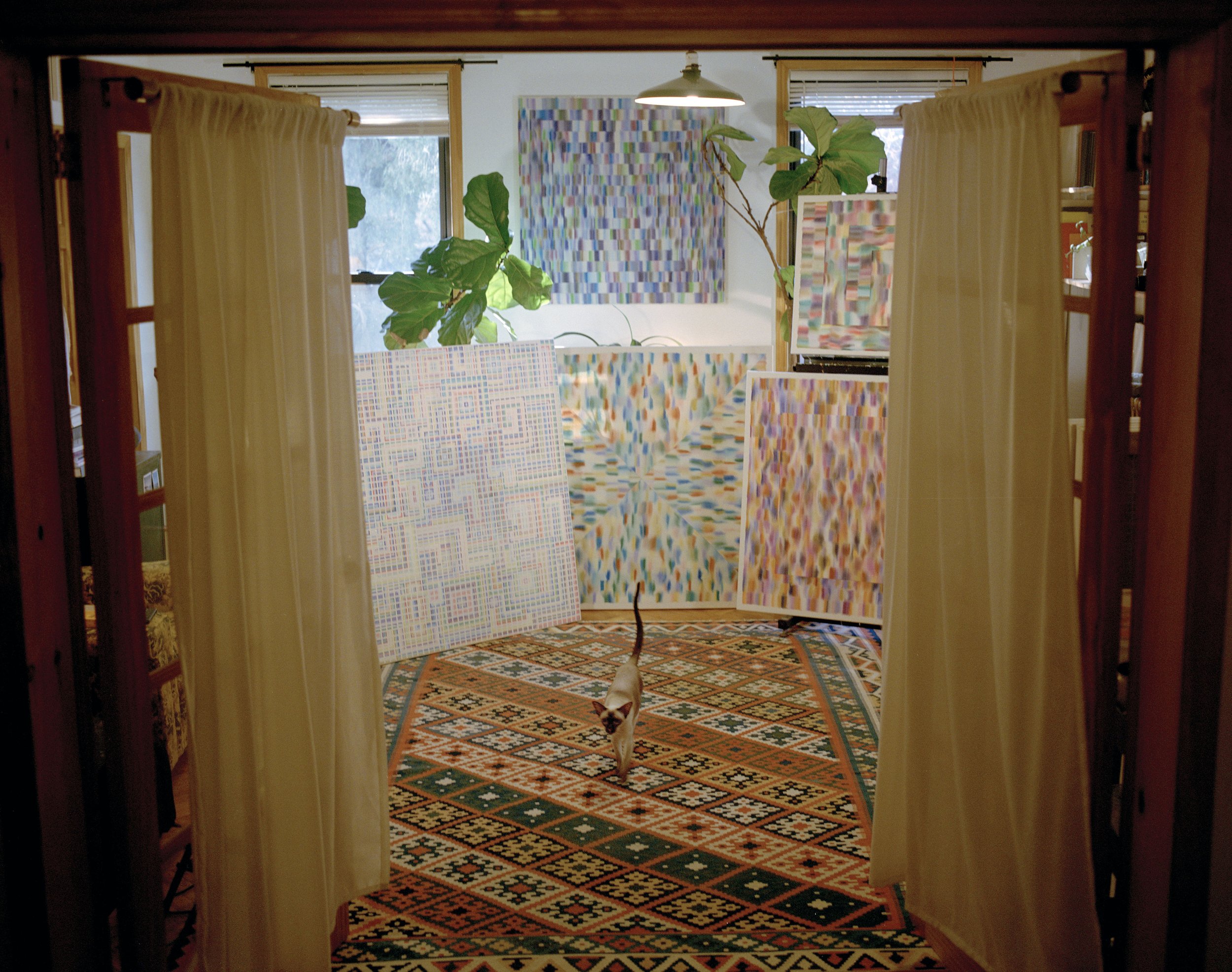An Interview With Devon Reina
Devon Reina is an abstract artist whose artistic journey has been shaped by his exploration of various mediums and his innate ability to critique art from a young age, influenced by his father, the Long Island-based artist Doug Reina.
In his artistic practice, Reina continuously strives to challenge the legibility of his work, prompting viewers to engage in a delicate balance between looking and seeing, interpreting and re-interpreting the intricate manipulations made to the canvas. Drawing inspiration from his product design background, he approaches his materials as collaborators rather than mere tools, forging a cooperative relationship that underscores his meticulous attention to their physical properties and forces.
This dedicated focus on materiality grants Reina's primary 2-dimensional designs an ethereal quality, evoking a sense of movement, distance, and light. By skilfully manipulating his chosen materials, he breathes life into his creations, inviting viewers into a captivating world where atmospheric elements converge with abstract forms.
Through his artistic endeavours, Devon Reina invites audiences to delve beyond the surface and immerse themselves in a profound exploration of perception and visual interpretation. His interdisciplinary background and unwavering passion for materiality shape his artistic vision, resulting in captivating artworks that bridge the realms of design and abstract expression.
Can you tell us a little bit about you?
I’m an abstract artist living and working from my home studio in Brooklyn, NY. Outside of my own studio practice, I work part time at a papermaking studio and occasionally assist other artists.
How has your artistic practice changed over time?
Throughout making several series of paintings, I’ve had the chance to catch myself thinking about certain themes. And although the concepts and themes may be consistent throughout my work, I find I tend to vary in my approach to the idea in question. For example, I remember making a body of work that dealt a lot with drafting a grid in pencil and so in the next series of paintings, I took the time to explore using these lines of the grid as a subtractive element as opposed to the scaffold that it was before. Instead of letting these lines sit beneath a field of pigments, I would remove material at the end of the process to create these lines.
Do you find yourself drawn to recurring themes or subjects in your work?
Absolutely. I’m so fascinated by the collective feedback and response of the hand, mind, and eye to draft an image. When you draw or paint anything really; it seems to me that each of these parts of the body are simultaneously engaged and critical in translating an idea. Another major theme in my work is the use of parameters. A few years ago, I challenged myself with the task of only creating square paintings. This restriction has pushed me to explore symmetry, the grid, and linework in directions that would otherwise never have happened. I think it’s a beautiful thing to grow through limitations.
How has your background in Product Design influenced your work?
Having a background in Product Design has definitely provided my practice with a unique perspective. As opposed to a more traditional painting process, I manufacture and craft my abstractions with a structured and methodical approach that often involves steps, rules, and guides. This approach of designing a production of a painting more than a final image is something that I find really fascinating and a direct result of my study and practice of design. As opposed to responding to a single color on a canvas, I want to respond to a finished canvas or series of canvases as I believe in a dedication to process.
What do you enjoy most about creating?
I find it really exciting to create a painting that can produce a response - particularly when that response is another painting. Making work is a reflective act - each painting leads to the next. To nurture a practice and watch it evolve before me is nothing short of extraordinary.
Your earliest memory of art?
My father, Doug Reina has been a full-time painter for as long as I can remember. I can recall him inviting a six-year-old me down to his studio to ask for critique of his recently completed work. Growing up surrounded by his practice has had a profound effect on the way I see art as well as how/why I pursue it. What’s even more special is that we can both share and exchange critique and suggestions to one another today. This is something I’m just so grateful for.
Who or what is your biggest artistic inspiration?
I’m not sure how I deem this as inspiration, but I think a lot about the time I live in and how my surroundings and beliefs have an effect on what I choose to create. Because when I really think about it, this is the only period of time that humans have had such power and control over image-making and sharing. I guess it’s inspirational in that I feel a duty to make what I do because I’m aware of the significance of my generation in painting.
Are there any particular artists that you are currently enjoying?
Currently, I’m really interested in the work of Richard Tinkler, Keltie Ferris, Joanne Greenbaum, Amy Sillman, and many others. I just love to see artists’ varying approaches to making an abstract painting or sculpture since there is never really a ‘right’ or ‘wrong’ way. To me, these artists’ work seem to share an emphasis on their production or process of creation and I enjoy seeing work that can acknowledge its creation.
What are you passionate about outside of art?
Alongside my artwork, I enjoy carving and casting small sculptures and jewelry. Living in NYC, I’m not far from the diamond district where there’s plenty of facilities that can cast a wax model that I make in my studio. It’s been a really rewarding process that I look forward to diving deeper into. And in addition to my creative side, I enjoy rock climbing and skateboarding as these activities both require a sort-of puzzle-solving mentality that I find really gratifying.
What is your favourite book or film and why?
Currently, my favorite book is “Notes From the Woodshed”, by Jack Whitten. It documents six decades of his private studio notes that were never meant to be shared. Peering into his personal experience of abstract art has really resonated with me because it has taught me how to write about my own work in my own words for no one but myself. This way, I can see my work and respond to it in a very honest and direct manner.
Are you working on any projects you are particularly excited about?
Currently, I’m finishing up a new body of paintings to follow up my two-person show at Uprise Art a couple months ago. This new body of work expands on my process of drawing, staining and dying raw canvas. One feature of these new works that I’m really excited about is the integration of patterns that are so subtle they are barely visible. I apply these patterns to the canvas early on and as accurately as possible, but as I later stain and agitate the surface, I choose to allow this imagery to nearly vanish. To me, the result is more of a sensation than a descriptive image and I find that really interesting.
Devon Reina - Instagram
Devon Reina - Website










